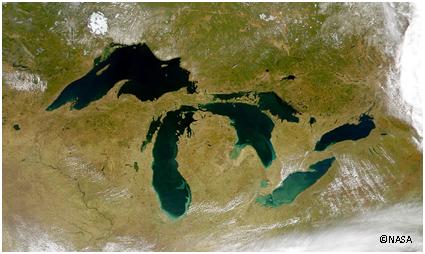Great Lakes Climate Adaptation Toolkit

EcoAdapt and Freshwater Future are committed to helping Great Lakes communities respond to the effects of climate change impacts and have developed the Great Lakes Climate Change Adaptation Toolkit with funding support from the Kresge Foundation. The toolkit is one component of Freshwater Future’s Great Lakes Community Climate Program, which includes workshops to train community groups on how to consider climate change impacts in their work and a grants program to assist with the implementation of on-the-ground projects.
The toolkit is divided into the following six parts:
- Improve Your Project's Success: Consider Climate Change and Adaptation: A primer on climate change and adaptation which includes climate variability and change in the Great Lakes region, climate impacts to plants, animals, and people, and a getting started on climate adaptation section.
- Four case studies on how community groups are incorporating climate change into their work, including the economic impacts and opportunities, community values, community engagement and action, and laws and regulations.
- Talking Climate: 10 Do's and Don'ts of Discussing Climate Change: A communications guidance on issues and success.
- What Does a More Variable Climate Mean for Great Lakes Communities: Why a more variable climate matters to your community.
- Great Lakes Climate Change Fact Sheets: Information on specific Great Lakes climate impacts (air temperature, lake levels, precipitation) and understanding the difference between mitigation and adaptation.
-
EcoAdapt's Climate Vulnerability Assessment Quick Guide: A guide to assist with vulnerability assessments.
The toolkit is available for free by contacting Freshwater Future at
(231) 348-8200. For more information on the Great Lakes Community Climate Program visit www.freshwaterfuture.org.
For more information on who is doing what in the Great Lakes, visit EcoAdapt's State of Climate Change Adaptation in the Great Lakes Region.




